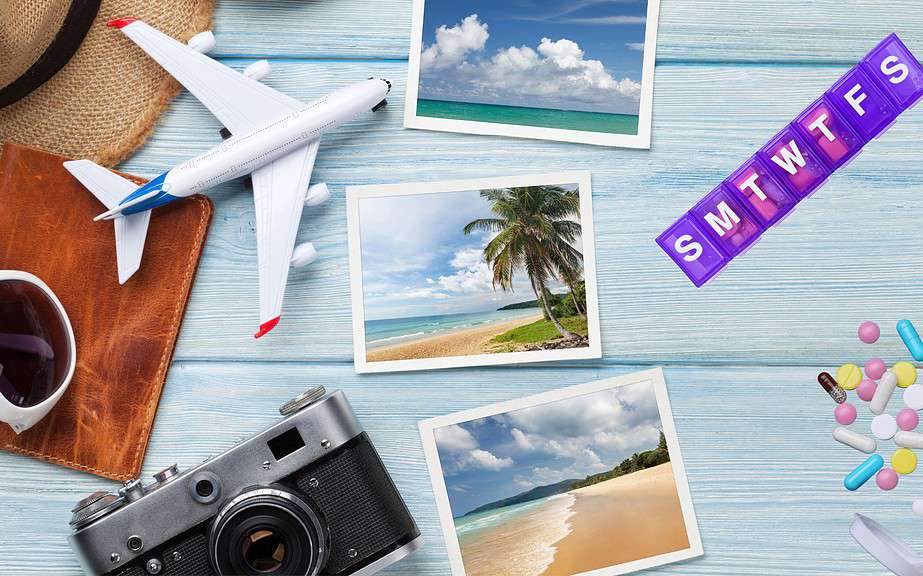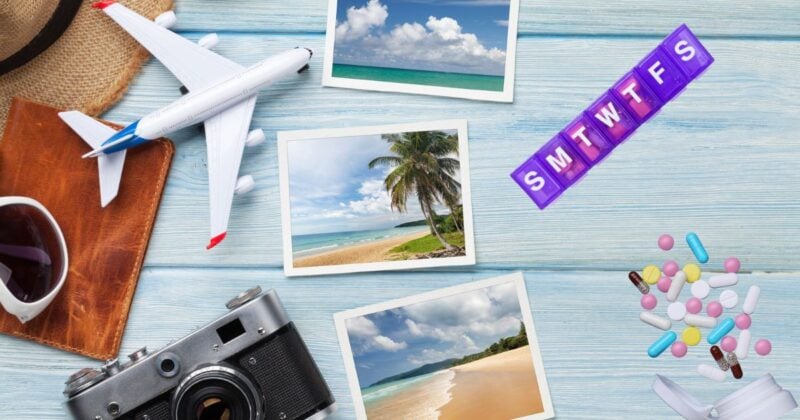
Picture this: you’re all set to go on your next adventure, but you’re stuck staring at your medicine cabinet, wondering what to pack. We’ve all been there! But no worries! You know Your Cruise Girl is always here to help you travel better. With help from an expert, you can ensure you have all the essential medical items to keep you healthy and happy throughout your travels.
This post may contain affiliate links, meaning I may receive a commission if you click a link and purchase something I recommended. Please check out my disclosure for more information.
Enter Dr. Carl Hughes, an internal medicine specialist who helps patients navigate their daily health issues at Tryon Medical Partners. As a patient at Tryon Medical Partners, I had the privilege of receiving Dr. Hughes’s expert advice on staying healthy during travels. As a seasoned traveler, Dr. Hughes knows the importance of being prepared for your health while on the road. So, whether you’re planning a weekend getaway or a more extended trip abroad, take a few minutes to read through his recommendations and pack your bags with confidence. After all, a little preparation can go a long way in ensuring a smooth and enjoyable trip!
Your Daily Meds

While writing this, as soon as I typed “Your Daily Meds,” I immediately thought of Our Daily Bread. Daily Meds, Daily Bread – get it? No? LOL
Sorry! Now back to your regularly scheduled blog post.
As I was saying, one thing you want to remember when packing for your trip is your daily meds. And if you’re traveling with kids, make sure to pack theirs too. You wouldn’t believe how many people forget to pack those essential medical items. Don’t worry about going through airport security with your meds, even if you need insulin and syringes – it should be fine. But to be safe, Dr. Hughes suggests bringing enough for the whole trip plus an extra five days’ worth. And make sure to keep your essential meds in your carry-on bag, so you will have them if your checked luggage gets lost.
A List of your daily medications
When traveling, it’s essential to be prepared for any situation. You can list your medications daily and keep them with you (along with your passport). This helps in an emergency, especially if you’re in a place where you don’t speak the language. Dr. Hughes suggests having this list ready in case you need to visit a clinic or hospital. It’ll make things go much more smoothly!
Mom uses the Notes app on her iPhone. I put my meds in the Health app on my iPhone. The list helps at appointments too!
Medication for nausea or diarrhea
It’s common to feel a bit queasy when you’re on the move. Sitting for a long time in a plane or car and changing food and water can easily upset your stomach. Dr. Hughes suggests packing anti-nausea medication like Zofran or antidiarrheal pills like loperamide (i.e., Immodium) or bismuth subsalicylate (i.e., Kaopectate or Pepto Bismol) tablets.
Zofran is only available by prescription. Talk to your healthcare provider if you think you may need it.
Dramamine (dimenhydrinate) and Bonine, Dramamine Less Drowsy (meclizine) are over-the-counter alternatives.
General pain reliever
As a rule of thumb, Dr. Hughes advises bringing any medical supplies you use every week or every other week. For many, this includes a general pain reliever to help with anything from a sore muscle to a headache.
Anti-itch cream
Remember to pack some anti-itch medication, especially if you’ll be hiking or exploring areas with bugs like mosquitoes. A good anti-itch cream can make your trip more enjoyable and comfortable.
Sleep aids
According to Dr. Hughes, taking one or two sleeping pills can be a great addition to your packing list. It can help you get some rest on an overnight flight and leave you feeling refreshed when you arrive at your destination. This can also help you beat jet lag and make the most of your trip.
Bandages
When traveling with kids, it’s always a good idea to bring some bandages along just in case of a little scrape or cut. And if you plan to do some hiking on your trip, Dr. Hughes recommends packing a few Band-Aids to prevent painful blisters and keep your feet happy on the trail.
Travel insurance
Traveling can be fun, but unforeseen events sometimes catch us off guard. That’s why having travel insurance is a great idea, especially if you’re older or have ongoing medical issues. It can give you peace of mind knowing that you’re protected in case of unexpected medical expenses or if you need to cancel your trip due to illness.
Read the full article and more about Dr. Hughes and Tryon Medical Partners here.
Traveling can be a thrilling and enriching experience, but it’s important to prioritize your health and safety. By including these 8 essential medical items in your travel kit, you can rest assured that you’ll be equipped to handle any minor health issues that may arise during your trip. Remember to pack your daily medications and a list of them, medication for nausea or diarrhea, a general pain reliever, anti-itch cream, sleep aids, bandages, and travel insurance for a stress-free adventure. With a little preparation and these medical essentials, you can focus on enjoying your travels and making memories that will last a lifetime.
